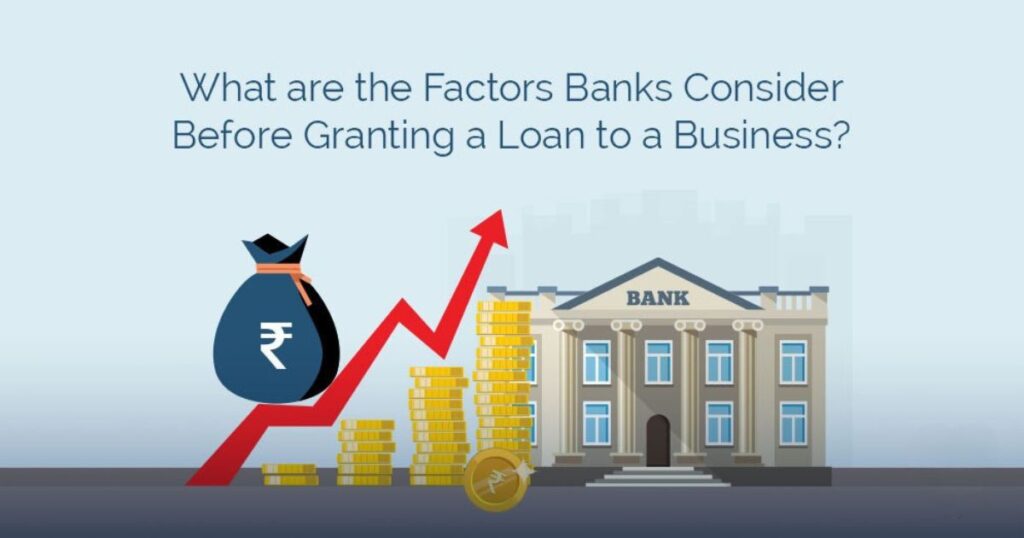What Factors Do Banks Consider When Evaluating a Business Loan Application in India?
Introduction
Securing funding is often a pivotal moment for any business in India, whether you’re laying the foundation for a new venture or fuelling the growth of an established enterprise. However, the path to obtaining a business loan can seem complex and intimidating, filled with paperwork and scrutiny. Understanding the core factors banks consider for business loan applications is not just helpful; it’s crucial, as it significantly boosts your probability of getting your loan approved. This article aims to demystify the process by breaking down the key criteria for business loan approval India, covering essential aspects from your personal credit standing to the robustness of your business plan. Whether you are a small business owner seeking expansion capital or an aspiring entrepreneur mapping out your startup journey, knowing precisely what banks look for in business loans will empower you to prepare a compelling and successful application.
Key Factors Banks Consider for Business Loan Approval
Banks operate on a principle of calculated risk. When you apply for a business loan, the lender undertakes a thorough evaluation process to assess the likelihood of getting their money back, along with the agreed-upon interest. This evaluation isn’t arbitrary; it’s based on a set of well-defined parameters designed to gauge the applicant’s reliability and the venture’s potential. Understanding these factors allows you to proactively address potential concerns and present your application in the best possible light. Let’s delve into the primary evaluation points that Indian banks scrutinize during the business loan assessment process.
1. Creditworthiness (Applicant & Business)
One of the foremost factors banks examine is the creditworthiness of both the promoters (owners/directors) and the business entity itself (if it’s already operational). Banks meticulously assess the borrower’s past behaviour in managing financial obligations to predict future repayment reliability. Your personal CIBIL score, or the credit score provided by other bureaus like Experian or Equifax, plays a monumental role; this three-digit number summarizes your credit history, and a score of 750 or above is generally considered favourable by most lenders, significantly impacting the criteria for business loan approval India. It reflects your diligence in handling past loans and credit cards, making it vital even when applying for a business loan. We strongly recommend checking your score beforehand through official channels like the CIBIL website. For existing businesses, banks will also review the Company Credit Report (CMR) to understand the business’s financial discipline. A consistent history of timely payments on all past debts is paramount, while defaults, significant delays, or settlements act as major red flags, indicating higher risk. Furthermore, banks analyze your existing debt obligations, both personal and business-related, often using a Debt-to-Income (DTI) ratio or a similar metric, to ensure you have sufficient surplus income to comfortably service the new loan alongside current liabilities. For guidance on checking your score, see our post on How to Track Your Credit History Using Your PAN Card Via CIBIL.
2. Business Plan Viability & Management Strength
Beyond the numbers, banks need unwavering confidence in the fundamental potential of your business idea and, critically, in the capability of the team leading it. Lenders carefully evaluate what banks look for in business loans, which invariably includes a sound business strategy and competent management. You must present a detailed business plan that serves as the roadmap for your venture; this document should comprehensively cover an Executive Summary, thorough Market Analysis (identifying target audience, competition, and market size), clear description of Products/Services offered, a practical Marketing and Sales Strategy, detailed profiles of the Management Team highlighting their relevant experience, and realistic Financial Projections (including projected revenue, operational expenses, and profitability forecasts for the next 3-5 years). The health and growth prospects of the specific industry you operate in, along with your business’s defined competitive advantage or unique selling proposition (USP), heavily influence the bank’s perception of risk. Equally important is the demonstrated experience and track record of the promoters or key management personnel; lenders favour teams with proven expertise relevant to the business domain. While the ‘business vintage’ or age of the enterprise matters, as established businesses often present lower risk due to their operational history, newer businesses can still secure funding by presenting an exceptionally strong business plan, showcasing significant owner equity investment, and demonstrating robust market potential.
3. Financial Health & Performance
A critical component of business loan application evaluation in India involves a deep dive into the financial stability and past performance of the business. Banks meticulously scrutinize your financial records to ascertain if the business generates enough profit and cash flow to sustain operations and comfortably repay the loan. Key business loan assessment factors revolve around your company’s financial statements. Lenders will analyze your Profit and Loss Statements and Balance Sheets for the last 2-3 years, looking for consistent revenue growth, healthy profit margins, and a strong net worth. Particular emphasis is placed on cash flow; banks need to see evidence of positive and stable operational cash flow, often by examining detailed bank account statements for the last 6 to 12 months, ensuring there’s enough liquidity to cover loan EMIs (Equated Monthly Instalments) after meeting operational expenses. While it’s useful for borrowers to be aware, banks often employ specific key financial ratios to standardize their assessment, such as the Debt Service Coverage Ratio (DSCR), which measures the ability to pay current debt obligations, and the Current Ratio, indicating short-term liquidity – though you typically don’t need to calculate these yourself, understanding their purpose helps. For established businesses, submitting audited financial statements prepared by a qualified Chartered Accountant significantly enhances credibility and transparency, making the bank’s assessment process smoother and potentially more favourable. Ensuring your financial records are accurate and professionally maintained is crucial; services like TaxRobo’s Accounting & Auditing services can be invaluable here. This underscores the importance of Maintaining Accurate Accounting Records for Tax Purposes.
4. Collateral / Security
To mitigate the inherent risk associated with lending, banks often require collateral, especially when dealing with substantial loan amounts, businesses with limited operating history, or perceived higher-risk industries. Collateral refers to an asset pledged by the borrower that the lender can seize and sell if the borrower defaults on the loan repayment. Understanding this aspect is vital when evaluating business loans for small businesses in India, as the availability and type of collateral can significantly influence loan terms. Common types of collateral accepted by Indian banks include real estate (residential or commercial property), valuable machinery or equipment, stock/inventory, fixed deposits, or even certain financial securities. Banks conduct a formal valuation of the proposed collateral to determine its marketable value and typically lend a certain percentage of this value, known as the Loan-to-Value (LTV) ratio (e.g., 60-80% of the property value). This leads to the distinction between secured loans (backed by collateral) and unsecured loans (no collateral required). Secured loans generally come with more favourable terms, such as lower interest rates and higher loan amounts, due to the reduced risk for the lender. However, various government initiatives, like the Credit Guarantee Fund Trust for Micro and Small Enterprises (CGTMSE), offer credit guarantees to banks, enabling them to provide collateral-free loans to eligible MSMEs, albeit sometimes with slightly higher interest rates or stricter eligibility criteria.
5. Loan Purpose & Amount Justification
Banks require absolute clarity on why you need the funds and how you intend to use them. The stated purpose of the loan must be legitimate, business-related, and clearly articulated in your application and business plan. Common purposes include financing working capital gaps, purchasing essential machinery or equipment, funding business expansion (like opening a new branch or entering a new market), acquiring inventory, or refinancing existing high-cost debt. Vague or unclear reasons for borrowing raise red flags. Furthermore, the loan amount requested must be adequately justified and directly linked to the stated purpose. You need to demonstrate precisely how you arrived at the specific figure, supported by quotations (for machinery), detailed cost estimates (for expansion projects), or working capital gap analysis. This justification should align seamlessly with the financial projections presented in your business plan, showing that the amount is necessary and sufficient for the intended use and that the business can generate adequate returns to repay it. Additionally, banks often prefer to see the promoters making a tangible financial contribution towards the project or funding requirement, known as promoter margin or owner’s equity. Typically, banks expect promoters to contribute anywhere from 15% to 30% (or more) of the total project cost or funding need, demonstrating their commitment and sharing the financial risk.
6. Documentation & Compliance
Navigating the process requires meticulous attention to paperwork, as proper and complete documentation is non-negotiable for loan processing and is fundamental to understanding business loan requirements in India. Banks adhere to strict checklists, and missing or inaccurate documents can lead to significant delays or even rejection. Ensure you have compiled all essential documents, which typically include: KYC (Know Your Customer) documents for all promoters/directors/partners (PAN Card, Aadhaar Card, Passport/Voter ID, recent utility bills for address proof); Business Proof documents (Certificate of Incorporation for companies (part of the process for Company Registration in India), Partnership Deed for firms, LLP Agreement, Shop Act License, GST Registration Certificate, Udyam Registration for MSMEs – TaxRobo’s Company Registration & GST services can assist with these); comprehensive Financial Documents including Income Tax Returns (ITRs) for both the promoters and the business for the last 2-3 years, audited financial statements (Balance Sheet, Profit & Loss account) if applicable, detailed bank account statements for the last 6-12 months, and recent GST returns (TaxRobo’s ITR Filing & GST Filing services ensure compliance); your detailed Business Plan and Loan Proposal; and finally, Collateral Documents (like property title deeds, valuation reports) if you are offering security. Beyond just submitting documents, banks also verify your business’s regulatory compliance. Being up-to-date with filings like Registrar of Companies (ROC) annual returns, GST payments and filings, Provident Fund (PF) and Employee State Insurance (ESI) contributions (if applicable), and other relevant statutory requirements demonstrates operational discipline and reduces perceived risk for the lender.
Tips for Improving Your Business Loan Application Success Rate
Securing a business loan involves careful preparation and strategic presentation. Based on the key factors banks evaluate, here are some actionable tips for business loan application India that can significantly enhance your chances of approval and potentially secure better terms:
- Prioritize Credit Health: Regularly monitor and actively work towards maintaining a strong personal CIBIL score (ideally 750+) and ensure your business (if existing) has a clean credit report. Address any discrepancies or errors proactively and make all existing payments on time.
- Craft a Compelling Business Plan: Develop a comprehensive, well-researched, and realistic business plan. Clearly articulate your business model, market opportunity, competitive advantages, management expertise, and provide detailed, logical financial projections. This is fundamental among best practices for business loan applications in India.
- Organize Financials Meticulously: Ensure your financial statements (P&L, Balance Sheet, Cash Flow) are accurate, up-to-date, and preferably audited if your business scale requires it. Keep bank statements and tax returns readily available. Consider professional help from services like TaxRobo Online CA Consultation Service to ensure accuracy and completeness.
- Ensure Full Compliance: Stay current with all statutory requirements, including ROC filings, GST returns, ITR filings, and any industry-specific licenses. Non-compliance is a major red flag for lenders.
- Be Prepared and Transparent: Know your business plan and financials inside out. Be ready to confidently answer questions from bank officials regarding your operations, projections, and the loan’s purpose. Honesty about challenges and mitigation strategies is often appreciated.
- Research Lender Requirements: Different banks might have slightly varied eligibility criteria, preferred industries, or specific loan schemes. Research and choose a lender whose products align well with your business profile and needs.
- Offer Collateral Strategically: If possible and appropriate for the loan size, offering suitable collateral can significantly improve approval chances and potentially lower interest rates, especially for larger funding requirements or newer businesses.
- Demonstrate Promoter Commitment: Clearly show your own financial contribution (promoter’s margin/equity) towards the business or project for which the loan is sought. This signals confidence and shared risk to the bank.
Conclusion
Navigating the business loan landscape in India requires diligence and a clear understanding of the lender’s perspective. As we’ve discussed, the primary factors banks consider for business loan approval revolve around a few critical pillars: your demonstrated Creditworthiness, the Viability of your Business Plan and strength of management, the Financial Health and performance of your enterprise, the availability of Collateral (where applicable), a clear Loan Purpose and justification, and meticulous Documentation & Compliance. Thorough preparation addressing each of these business loan assessment factors is paramount for a successful business loan application evaluation in India. By proactively strengthening these areas and presenting a well-organized application, you significantly enhance your prospects of securing the funding needed to achieve your business goals.
Feeling overwhelmed by the documentation and compliance requirements? Ensuring your financial records, tax filings, and business registrations are impeccable can make a substantial difference in your loan application’s strength. TaxRobo specializes in simplifying these complexities for small businesses and entrepreneurs. Contact TaxRobo today for expert assistance with Accounting, Auditing, GST Registration & Filing, ITR Filing, and Company Registration needs – let us help you put your best foot forward.
Frequently Asked Questions (FAQ)
- Question 1: What is considered a good CIBIL score for a business loan in India?
Answer: Generally, a personal CIBIL score of 750 or above for the promoters/directors is considered good and significantly improves your chances of loan approval and potentially better interest rates. However, banks evaluate the entire profile, including business financials and other factors, so a slightly lower score might be acceptable if other aspects are strong, though minimum thresholds (often around 700) may apply. Requirements can vary between lenders. - Question 2: Can I get a business loan in India without collateral?
Answer: Yes, it is possible to get unsecured business loans in India without pledging collateral. These are often available for smaller loan amounts or through specific government schemes designed to support MSMEs, such as the CGTMSE scheme. However, compared to secured loans, unsecured loans might come with stricter eligibility criteria, potentially higher interest rates, and shorter repayment tenures due to the increased risk for the lender. - Question 3: How important is a detailed business plan for loan approval?
Answer: A detailed business plan is critically important, especially for startups, businesses seeking significant funding, or those undergoing major expansion. It serves as the primary document showcasing your business’s viability, market understanding, operational strategy, management capability, and, crucially, its projected ability to generate sufficient revenue to repay the loan. It’s one of the key factors banks consider for business loan evaluation, demonstrating foresight and planning. - Question 4: My business is less than a year old. Can I still get a business loan?
Answer: While challenging, obtaining a business loan for a company less than a year old is possible, though options might be more limited compared to established businesses. Banks will place extremely high scrutiny on the business plan’s robustness, the promoters’ relevant industry experience and financial background, the market potential, realistic financial projections, and potentially require higher promoter equity or collateral. Exploring specific startup loan schemes offered by banks or under government initiatives like Startup India might also be beneficial. - Question 5: What are the most common reasons for business loan rejection in India?
Answer: Common reasons for loan rejection include a poor personal or business credit history (low CIBIL score, past defaults), weak financial performance (low profitability, inconsistent cash flow), unrealistic or poorly prepared business plan and financial projections, insufficient collateral or inability to meet margin requirements (for secured loans), incomplete or inaccurate documentation, failure to meet the bank’s specific eligibility criteria (like minimum turnover or years in operation), non-compliance with statutory regulations, or the bank perceiving the business model or industry as too high-risk.



